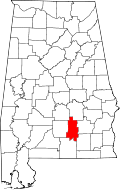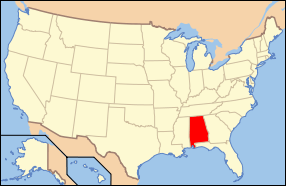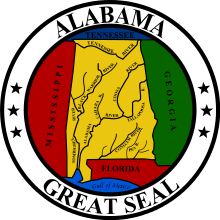Crenshaw County, Alabama
| Crenshaw County, Alabama | |
|---|---|
|
Crenshaw County courthouse in Luverne | |
 Location in the U.S. state of Alabama | |
 Alabama's location in the U.S. | |
| Founded | November 30, 1866 |
| Named for | Anderson Crenshaw |
| Seat | Luverne |
| Largest city | Luverne |
| Area | |
| • Total | 611 sq mi (1,582 km2) |
| • Land | 609 sq mi (1,577 km2) |
| • Water | 2.1 sq mi (5 km2), 0.3% |
| Population (est.) | |
| • (2015) | 13,963 |
| • Density | 23/sq mi (9/km²) |
| Congressional district | 2nd |
| Time zone | Central: UTC-6/-5 |
| Website |
crenshawcountyalonline |
|
Footnotes:
| |
Crenshaw County is a county of the U.S. state of Alabama. It is south from the Montgomery metropolitan area. As of the 2010 census, the population was 13,906.[1] Its county seat is Luverne.[2] Its name is in honor of a judge, Anderson Crenshaw.
History
Crenshaw County was established on November 30, 1866. It was formed from parts of Butler, Coffee, Covington, Pike and Lowndes counties.
Geography
According to the U.S. Census Bureau, the county has a total area of 611 square miles (1,580 km2), of which 609 square miles (1,580 km2) is land and 2.1 square miles (5.4 km2) (0.3%) is water.[3] Much of the land is covered by forests that are used for logging.
Major highways
 U.S. Highway 29
U.S. Highway 29 U.S. Highway 331
U.S. Highway 331 State Route 10
State Route 10 State Route 97
State Route 97 State Route 106
State Route 106 State Route 141
State Route 141 State Route 189
State Route 189
Adjacent counties
- Montgomery County (north)
- Pike County (east)
- Coffee County (southeast)
- Covington County (south)
- Butler County (west)
- Lowndes County (northwest)
Demographics
| Historical population | |||
|---|---|---|---|
| Census | Pop. | %± | |
| 1870 | 11,156 | — | |
| 1880 | 11,726 | 5.1% | |
| 1890 | 15,425 | 31.5% | |
| 1900 | 19,668 | 27.5% | |
| 1910 | 23,313 | 18.5% | |
| 1920 | 23,017 | −1.3% | |
| 1930 | 23,656 | 2.8% | |
| 1940 | 23,631 | −0.1% | |
| 1950 | 18,981 | −19.7% | |
| 1960 | 14,909 | −21.5% | |
| 1970 | 13,188 | −11.5% | |
| 1980 | 14,110 | 7.0% | |
| 1990 | 13,635 | −3.4% | |
| 2000 | 13,665 | 0.2% | |
| 2010 | 13,906 | 1.8% | |
| Est. 2015 | 13,963 | [4] | 0.4% |
| U.S. Decennial Census[5] 1790–1960[6] 1900–1990[7] 1990–2000[8] 2010–2015[1] | |||
As of the census[9] of 2000, there were 13,665 people, 5,577 households, and 3,892 families residing in the county. The population density was 22 people per square mile (9/km2). There were 6,644 housing units at an average density of 11 per square mile (4/km2). The racial makeup of the county was 73.82% White, 24.79% Black or African American, 0.37% Native American, 0.11% Asian, 0.01% Pacific Islander, 0.20% from other races, and 0.70% from two or more races. 0.64% of the population were Hispanic or Latino of any race.
There were 5,577 households out of which 31.00% had children under the age of 18 living with them, 50.70% were married couples living together, 15.40% had a female householder with no husband present, and 30.20% were non-families. 28.20% of all households were made up of individuals and 14.70% had someone living alone who was 65 years of age or older. The average household size was 2.42 and the average family size was 2.96.
In the county the population was spread out with 24.70% under the age of 18, 7.90% from 18 to 24, 26.30% from 25 to 44, 23.90% from 45 to 64, and 17.10% who were 65 years of age or older. The median age was 39 years. For every 100 females there were 89.80 males. For every 100 females age 18 and over, there were 83.60 males.
The median income for a household in the county was $26,054, and the median income for a family was $31,724. Males had a median income of $27,286 versus $17,703 for females. The per capita income for the county was $14,565. About 18.60% of families and 22.10% of the population were below the poverty line, including 28.30% of those under age 18 and 23.50% of those age 65 or over.
2010 census
As of the census[10] of 2010, there were 13,906 people, 5,652 households, and 3,882 families residing in the county. The population density was 23 people per square mile (9/km2). There were 6,735 housing units at an average density of 11 per square mile (4/km2). The racial makeup of the county was 72.6% White, 23.4% Black or African American, 0.4% Native American, 1.4% Asian, 0.1% Pacific Islander, 0.7% from other races, and 1.5% from two or more races. 1.5% of the population were Hispanic or Latino of any race.
There were 5,652 households out of which 27.3% had children under the age of 18 living with them, 48.7% were married couples living together, 15.6% had a female householder with no husband present, and 31.3% were non-families. 28.1% of all households were made up of individuals and 11.9% had someone living alone who was 65 years of age or older. The average household size was 2.44 and the average family size was 2.97.
In the county the population was spread out with 23.8% under the age of 18, 8.0% from 18 to 24, 23.6% from 25 to 44, 28.7% from 45 to 64, and 15.9% who were 65 years of age or older. The median age was 40.7 years. For every 100 females there were 93.4 males. For every 100 females age 18 and over, there were 95.3 males.
The median income for a household in the county was $35,140, and the median income for a family was $47,685. Males had a median income of $35,598 versus $22,410 for females. The per capita income for the county was $19,793. About 13.7% of families and 17.7% of the population were below the poverty line, including 25.5% of those under age 18 and 16.7% of those age 65 or over.
Government
| Year | GOP | DNC | Others |
|---|---|---|---|
| 2016 | 72.0% 4,511 | 26.6% 1,663 | 1.4% 89 |
| 2012 | 67.5% 4,326 | 31.9% 2,048 | 0.6% 37 |
| 2008 | 68.7% 4,319 | 30.8% 1,938 | 0.5% 34 |
| 2004 | 68.7% 3,777 | 30.9% 1,698 | 0.4% 25 |
| 2000 | 58.3% 2,793 | 40.3% 1,934 | 1.4% 68 |
Communities
City
- Luverne (county seat)
Towns
Unincorporated communities
See also
- National Register of Historic Places listings in Crenshaw County, Alabama
- Properties on the Alabama Register of Landmarks and Heritage in Crenshaw County, Alabama
References
- 1 2 "State & County QuickFacts". United States Census Bureau. Retrieved May 16, 2014.
- ↑ "Find a County". National Association of Counties. Archived from the original on 2011-05-31. Retrieved 2011-06-07.
- ↑ "2010 Census Gazetteer Files". United States Census Bureau. August 22, 2012. Retrieved August 22, 2015.
- ↑ "County Totals Dataset: Population, Population Change and Estimated Components of Population Change: April 1, 2010 to July 1, 2015". Retrieved July 2, 2016.
- ↑ "U.S. Decennial Census". United States Census Bureau. Archived from the original on May 11, 2015. Retrieved August 22, 2015.
- ↑ "Historical Census Browser". University of Virginia Library. Retrieved August 22, 2015.
- ↑ Forstall, Richard L., ed. (March 24, 1995). "Population of Counties by Decennial Census: 1900 to 1990". United States Census Bureau. Retrieved August 22, 2015.
- ↑ "Census 2000 PHC-T-4. Ranking Tables for Counties: 1990 and 2000" (PDF). United States Census Bureau. April 2, 2001. Retrieved August 22, 2015.
- ↑ "American FactFinder". United States Census Bureau. Archived from the original on 2013-09-11. Retrieved 2011-05-14.
- ↑ "American FactFinder". United States Census Bureau. Archived from the original on 2013-09-11. Retrieved 2015-07-20.
- ↑ "Dave Leip's Atlas of U.S. Presidential Elections". Retrieved November 16, 2016.
 |
Lowndes County | Montgomery County |  | |
| Butler County | |
Pike County | ||
| ||||
| | ||||
| Covington County | Coffee County |
Coordinates: 31°43′41″N 86°18′36″W / 31.72806°N 86.31000°W
